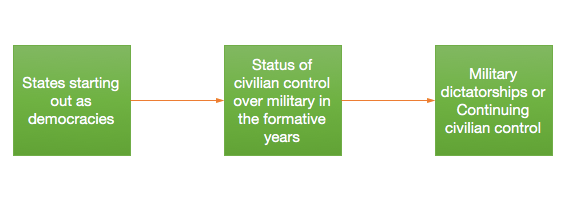Pranay Kotasthane
Israel was the talk of the Indian towns last week. For the first time, an Indian Prime Minister paid a visit to Israel. This, after India recognised Israel in 1950 and accorded the ties full diplomatic status in 1992.
Obviously, the talk about Israel occupied Facebook walls as well. In one such interesting conversation, a few learned folks were discussing this: the two religious States — Israel and Pakistan—were both created for the explicit purpose of securing a homeland for religious minorities. Given their preoccupation with security, the military-security establishment occupied a key position in the politics of the two States. Yet, what can explain this fundamental difference: while Pakistan has had several bouts of rule by military dictatorship, Israel has steadfastly retained electoral democracy?
This is an interesting question. Now, the similarities between Israel and Pakistan are well documented. Faisal Devji’s 2013 book Muslim Zion argues that
Like Israel, Pakistan came into being through the migration of a minority population, inhabiting a vast subcontinent, who abandoned old lands in which they feared persecution to settle in a new homeland. Just as Israel is the world’s sole Jewish state, Pakistan is the only country to be established in the name of Islam.
In this regard, the military dictator Gen Zia-ul-Haq’s remarks made in an interview to The Economist in 1981 are also instructive:
Pakistan is like Israel, an ideological state. Take out the Judaism from Israel and it will fall like a house of cards. Take Islam out of Pakistan and make it a secular state; it would collapse.
Despite these similarities, what explains the difference with regards to democracy and dictatorship in the two States?
My hypothesis to explain the difference is this: the mediating variable between democracy and dictatorship is the status of civil-military relations in the formative years.
 A simplified model to explain the difference with regards to democracy and dictatorship in Israel and Pakistan
A simplified model to explain the difference with regards to democracy and dictatorship in Israel and Pakistan
The basis of this hypothesis is a theory developed in Steven Wilkinson’s excellent book Army and Nation. The book tries to explore why the armies in India and Pakistan—although cut from the same cloth—became such markedly different domestic political actors in their respective democracies. My case is that the arguments mentioned in the book apply equally to the Israel—Pakistan comparison. Here’s how.
Wilinson lists three factors for the difference between the armies of independent India and Pakistan:
India’s socio-economic, strategic and military inheritance in 1947 was much better than that of Pakistan. Among other things, Partition worsened the ethnic balance in the Pakistan army while improving it somewhat in the Indian army.
The Congress party — unlike the Muslim League in Pakistan — was strongly institutionalised and had a political reach and presence that was difficult to replicate, let alone dislodge.
During the first decade of independence the Indian government took specific “coup proofing” measures: new command and control structures, careful attention to promotions, tenures, and balancing ethnic groups at the top of the military, and attention to top general’s career pathways after retirement.
Now, if these exact factors related to civil-military relations in the formative years are applied to the Israel-Pakistan case, one can see that points (2) and (3) were exactly what David Ben-Gurion and his political forces managed to accomplish in Israel, just like it was done in India. And hence while Israel managed to retain civilian superiority over its military forces, Pakistan kept having episodic military dictatorships.
The follow-up question would then be: was Jinnah’s death immediately after Pakistan’s formation a big reason for the path it took, while India and Israel had the benefit of dominant, long-standing civilian leaders in the formative years?
I don’t think so. If Jinnah would have lived longer after Partition, it is likely that he would have put specific “coup proofing” measues in place [point (3) in Wilkinson’s schema]. However, worsening ethnic balance of the army and a weakly institutionalised Muslim League [points (1) and (2)] would’ve still remained intractable. The paths that Israel and Pakistan are now on has a lot to do with what happened in the formative years of the two democracies.
No comments:
Post a Comment